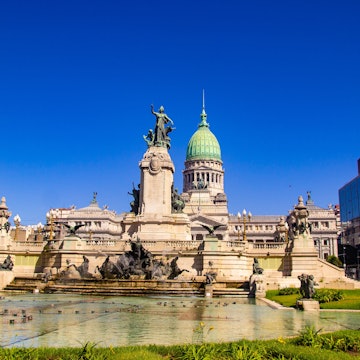

The co-working culture in Buenos Aires is well established © Fabian Schmiedlechner / EyeEm / Getty Images
Argentina’s biggest city vibrates with activity, from the day to the tango-filled night. Here's why you should consider Buenos Aires as your destination for remote working.
Editor's note: during COVID-19 there are restrictions on travel. Check the latest guidance before departure, and always follow local health advice.
Why should digital nomads choose Buenos Aires?
Many digital nomads are drawn to Buenos Aires by its Latin flavour, uninhibited nightlife, low living costs and immersive local culture. If you come here to work and leave without learning Spanish, tango and the importance of a gauchada (good deed), you’ve missed out on a big part of the fun of living in the city. Becoming a porteño (port city dweller) is only part of the appeal. Buenos Aires has a well-established co-working culture, plenty of local start-ups, and a lively expat community to plug into on arrival. Speaking Spanish will bring dividends for expanding your social network here. BA’s local government is also looking to approach entrepreneurs with projects such as IncuBAte, which offers support and subsidies for start-ups that have a tangible benefit to the city.
However, nomads have some administrative hoops to leap through during extended stays in Buenos Aires. Most travelers are granted visa-free entry to Argentina for 90 days on arrival; if you want to stay longer, you’ll have to get used to nipping over to neighboring countries for a new entry stamp, or applying for a prórroga (visa extension). To
avoid the hassle, many nomads simply overstay and pay a moderate fine at the airport on departure.

Best co-working spaces
For co-working and co-living in one space, NomadHub in Retiro offers smart rooms and workspaces, fast wi-fi and a strong community spirit in a handy location just southeast of Palermo. It’s a good first stop before setting up on your own, once you’re familiar with the city.
Internet speeds
Download speeds of 16 Mbps are easy to find, and co-working spaces offer much faster connections. Most cafes have free wi-fi and the government provides free public connections in many parks, plazas and public spaces. Mobile 4G
connections are easy to find, but download speeds can be lower than expected.
Living arrangements
Buenos Aires has a scattering of co-living spaces that are great for new arrivals, but longer term residents tend to look for rooms to rent. There’s a culture of over-charging, so for rooms at the same prices locals pay, ask around on expat forums and Facebook groups. Fresh from the airport, many travelers go overboard on red meat and wine at inexpensive local parrillas (grill-houses), but healthier food isn’t hard to find. For cheap eats, seek out mom-and-pop snack-stops serving empanadas (pasties) and morcipán and choripán sausage sandwiches. All parts of the city can be reached cheaply via the subway or local buses.
Networking
Connect with other expats through Buenos Aires Expats Community and the Facebook Group Buenos Aires Expat Hub.

Things to do when you're not working
Learn to tango – tourist oriented shows abound, but for the real deal, visit a local milonga if you like to join locals dancing purely for the love of dance. Try Milonga Parakultural at Salón Canning in Palermo.
Mingle with the dead at Recoleta Cemetery – the city’s most famous cemetery – is a tangled maze of pathways, lined with the grand mausoleums of wealthy Porteños, including the revered tomb of Eva Perón.
Explore the Paraná Delta – when the city gets too much, jump on a train to Tigre, and rent a motorboat or kayak to roam around the interconnected canals and waterways, or browse the waterfront craft market.

Pros and cons
As with every travel experience in any destination, there are good bits and bad. Here's a breakdown of things to consider:
Buenos Aires is great for:
★ Culture
★ Nightlife
★ Low cost of living
★ Expat lifestyle
★ Cheap public transport.
Buenos Aires is not so great for:
★ Traffic noise
★ Urban sprawl
★ Petty crime
★ Crowds
★ Currency fluctuations.

Practicalities
Climate: Buenos Aires has a short, hot summer (December to February), with regular heat spikes and a risk of thunderstorms; the winter (June to August) feels like a European spring. The shoulder seasons bring pleasantly warm (not hot) conditions, but regular rain showers.
Getting there: Ministro Pistarini International, Buenos Aires. Buses run to all neighboring countries, and boats zip from Buenos Aires to Montevideo and Colonia in Uruguay.
Living costs: US$1100 per month.
LGBT-friendly: Yes.
Pre-departure reading
Lonely Planet’s Argentina and Buenos Aires guidebooks
The Tango Singer by Tomás Eloy Martínez
La Autopista del Sur y Otros Cuentos by Julio Cortázar
My Fathers’ Ghost Is Climbing in the Rain by Patricio Pron.
This extract is from Lonely Planet's Digital Nomad Handbook, available now at Lonely Planet Shop.
You might also like:
Everything you need to consider before becoming a digital nomad
10 reasons why you should become a digital nomad in 2021
Lonely Planet's ultimate digital nomad packing list
Take your Argentina trip with Lonely Planet Journeys
Time to book that trip to Argentina
Lonely Planet Journeys takes you there with fully customizable trips to top destinations–all crafted by our local experts.

























